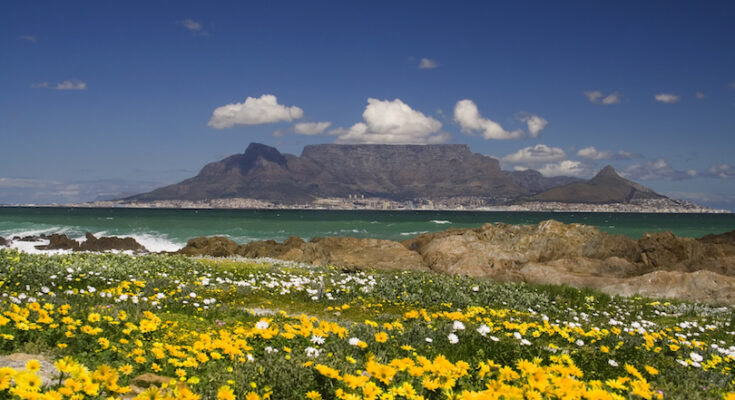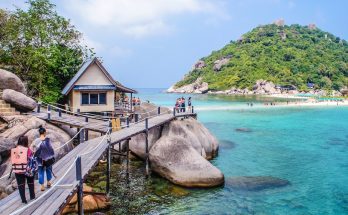Lying along South Africa’s southwest coast, charming, colourful Cape Town is set in one of the most stunning spots imaginable. Overlooked by iconic Table Mountain, it is known for its sparkling shores, sweeping views and hugely interesting historic sights.
While autumn and spring are lovely times to visit, the Mother City’s peak tourist season runs from December through February. During these sunny, summer months, you can relax on its beautiful beaches and enjoy all its exciting outdoor activities. Loads of fun festivals also take place with a lively yet relaxed feel reigning everywhere.
To help you organize your trip, let’s take a look at what the weather is like and what cultural events are going on each month in Cape Town. We’ll also cover what periods are busiest and when prices are higher or lower.
In this post, we’ll cover:
What’s the Weather Like in Cape Town?
Sprawling alongside the immense Table Bay and the endless Atlantic Ocean, Cape Town enjoys a warm Mediterranean climate. While its winters (so June to August) are mild but rather rainy, summers are dry and hot with average temperatures of around 24 to 25°C (75 to 77°F).
Despite the days being long and sunny, things can suddenly become quite chilly, particularly if you’re in the shade and strong winds blow in from the ocean. This phenomenon is called the ‘Cape Doctor’ as it blows any air pollution away.
While still warm and sunny, the autumn months of March to May are slightly chillier with the winter rains also picking up towards the end of it. Springtime, so September to November, is similar though a bit windier. This season sees Cape Town burst with colour as all its flowers, plants, trees and shrubs are in bloom.
Best months to visit Cape Town
As it is hot, sunny and there are plenty of summer events to attend, December to February is by far the most popular period to visit Cape Town. While the weather is perfect for either sunbathing or sightseeing, prices are at their highest while everywhere heaves with people.
Many instead prefer the autumn months of March to May as things are a bit calmer, cheaper and there are fewer crowds. Averages of 19 to 24°C (66 to 75°F) are still ideal for hiking and cycling or touring the nearby Cape Winelands. This is also one of the best times to see the adorable penguins at Boulders Beach as it is their nesting season.
Spring too is a great time to visit as Table Mountain, the Lion’s Head and Devil’s Peak are all coated in pretty wildflowers. Other than taking road trips along the Garden Route, you can go shark cage diving or watch majestic whales migrating along the coast.
Cape Town in January

With its long, hot days and bright blue sunny skies, January is one of the best (and busiest!) months to visit Cape Town. Besides lounging on Clifton Beach or ambling about the colourful Bo-Kaap quarter, you can always shop and dine along the Victoria & Alfred Waterfront. Most of its main attractions will be pretty full though with hotels also at their most expensive.
Getting the year off to a great start though are all the jubilant parades that are held for the Tweede Nuwe Jaar celebration on January 2nd. The prestigious L’Ormarins King’s Plate Racing Festival also attracts lots of crowds with all its exhilarating equestrian events. As its weather can be a bit balmy, January is also one of the best months to go kitesurfing or windsurfing.
Cape Town in February

As the peak tourist season is coming towards an end, Cape Town’s prices and crowds are a bit more manageable in February. There are still 10 hours of sunshine and 13 hours of daylight per day in which to explore the city. As its waters are at their warmest, this is a fantastic month to sunbathe, swim or surf without it being too crowded or cold.
Tons of top events also take place like its International Jazz Festival and Up the Creek Music Festival. While hundreds of thought-provoking exhibitions are put on for the Cape Town Art Fair, exuberant parties and parades light up the place for Pride. As the weather is warm, dry and sunny, it’s worth visiting Langebaan’s beaches or hiking about the Cape of Good Hope.
Cape Town in March

Although still very hot and dry, March is the start of autumn in South Africa. While the days are slightly shorter now, conditions are even better for enjoying outdoor activities. The Cape Town Cycle Tour takes you by some of its most arresting scenery with the more challenging Cape Epic race also going on. As there is usually less wind, the ferry ride to Robben Island is much calmer.
Before the Easter holidays come around, prices for flights and hotels are much cheaper with fewer crowds now milling about the waterfront. As it is their nesting season, many head to see the cute little penguins at Boulders Beach. Aside from admiring the amazing floats and costumes at the Cape Town Carnival, make sure to check out its Summer Wines Festival.
Cape Town in April

With the weather starting to cool and the skies sometimes being a bit cloudy, fewer people visit the Mother City in April. That doesn’t stop airfares from being higher around the Easter holidays though most attractions remain crowd-free. While averages of 22°C (71°F) are a bit cool for sunbathing on the beach, the mostly dry days are wonderful for hiking up Table Mountain or cruising along Chapman’s Peak Drive.
Other than heading to the Cape Winelands during harvest season, you can attempt the Two Oceans Marathon. Billed as ‘the world’s most beautiful marathon’, it winds its way about the scenic Cape Peninsula. Before the weather worsens in May, it’s also well worth setting off on an unforgettable road trip along the Garden Route.
Cape Town in May

As the rains pick up and temperatures drop, May is one of the quietest months tourist-wise in Cape Town. With around 12 rather rainy days on average, it’s a good time to explore the District Six Museum, Two Oceans Aquarium and Castle of Good Hope. Make sure to layer up and take an umbrella with you when you’re walking about outside.
To entice diners, many restaurants offer special deals with accommodation and airfares also being more affordable in May. With around 6 hours of sunshine a day, you can still hike and bike about all its lovely landscapes when it’s not raining. Countless thousands also come for AfrikaBurn when imaginative art installations and concerts are held in the Tankwa Karoo.
Cape Town in June

With average temperatures in June hovering around 17°C (62°F), winter has well and truly arrived in the Western Cape. The weather in Cape Town is usually cool and crisp with nights being particularly chilly. While there is still a decent amount of sunshine and daylight, it can sometimes rain for two weeks straight.
When the skies are clear and blue, you can enjoy phenomenal views from atop Lion’s Head and Signal Hill. As there are barely any tourists around, it’s also worth ambling about the art collections in Zeitz MOCAA or perusing all the upmarket shops at the Canal Walk. Flights and hotels are also much cheaper than in either July or August as June is the low season.
Cape Town in July

While the winter weather remains roughly the same in July – so wet, chilly and windy – more visitors arrive as people have summer holidays in Europe. Airfares are way more expensive with more crowds now seen at the Victoria & Alfred Waterfront. While Table Mountain’s cool, rotating cableway closes for two weeks for maintenance, it is at least peak whale season.
Other than heading to the nearby Hermanus to see the gentle ocean giants passing by, you can have fun and enjoy all things French at the Franschhoek Bastille Festival. On top of this, the Stellenbosch International Chamber Music Festival is yet another reason to tour all the region’s fabulous vineyards.
Cape Town in August

August is also quite quiet in Cape Town as average temperatures remain low and it rains for about 14 days of the month. If you don’t mind the sporadic showers and potentially getting wet, there are still about 7 hours of sunshine per day to wander about in. With fewer people around, you can best enjoy its historic sights and fine dining establishments.
Aside from seeing massive great whales migrating along the coast, the winter months are among the best for both surfing and shark cage diving. As it is also safari season in SA, many combine trips to Cape Town with tours around Kruger National Park. If you don’t fancy flying across the country, you can always watch the country’s Premier Soccer League kick-off.
Cape Town in September

As September is the start of spring, its rains finally start to ease up a bit with wildflowers blooming all around the Cape. It is still the low season, however, with flight prices dropping considerably after the more expensive ‘summer’ months. Before the crowds swell in October, it’s a splendid time to stroll about Bo-Kaap and the Kirstenbosch National Botanical Gardens.
While it’s still a bit chilly and it does rain for around 11 days on average, many people spend time outdoors at the Darling Wildflower Show. In addition to taking photos of all the pretty flowers, you can also attend the popular Hermanus Whale Festival. While keeping an eye out for the majestic creatures, concerts, markets and a street parade all take place.
Cape Town in October

With the weather slowly warming up and the days being longer, sunnier and drier, October is an even better month to visit the Mother City. Both its hotel and flight prices rise though as more people pour in. As well as seeing sharks, whales and wildflowers, you can enjoy its idyllic coastline before all the summer crowds arrive. Most of the penguin colony at Boulders Beach will be at sea though as this is when they head off to feed.
Due to all the resplendent flowers on show, hiking Table Mountain is particularly picturesque in October. Visitors can also listen to some excellent acts at either Rocking the Daisies or the Cape Town Country Music Festival. Its International Kite Festival is also well worth attending as countless colourful kites stand out dramatically against its bright blue skies.
Cape Town in November

November is another fantastic month to visit as there are now 10 hours of sunshine and 14 of daylight each day to walk about in. While average temperatures climb to 22°C (71°F), the Cape Doctor does blow through quite regularly. All in all, its dry, warm days are ideal for lounging on the beach or enjoying epic outdoor activities.
Aside from hiking about Kirstenbosch or Cape Point, you can explore Robben Island and the Victoria & Alfred Waterfront before they get overrun in December. While airfares are actually quite cheap, accommodation prices are more expensive than other months. Numerous arts, crafts and dance performances are on display at the Streetopia Festival with November also being a good time to take a road trip along the Garden Route.
Cape Town in December

While December’s long, hot, sunny days are perfect for relaxing on the beach, it is also the peak season in Cape Town when everywhere is packed. Both its hotel and flight prices shoot up, particularly around the Christmas holidays. Due to all the crowds, expect to queue at its main attractions like Table Mountain and Cape Point.
A lively yet laidback atmosphere takes over with loads of awesome events like the Summer Sunset Concerts at Kirstenbosch going on. Besides checking out Clifton Beach and the Cape Winelands, you can enjoy snorkeling and scuba diving in its cool waters. Christmas markets and its Festival of Lights then brighten up Cape Town for the holidays before music concerts and fireworks displays welcome in the New Year along its waterfront.



